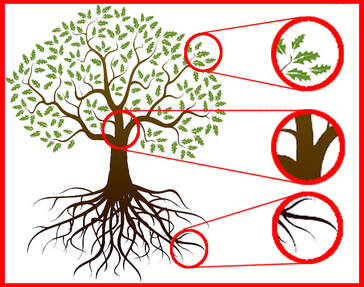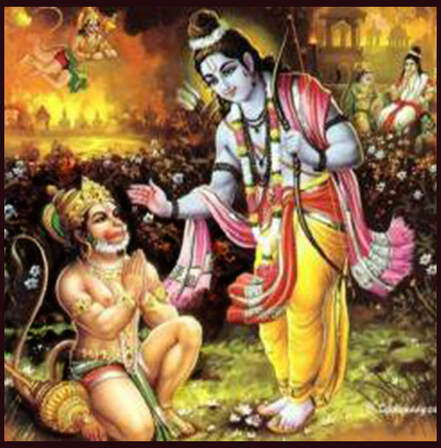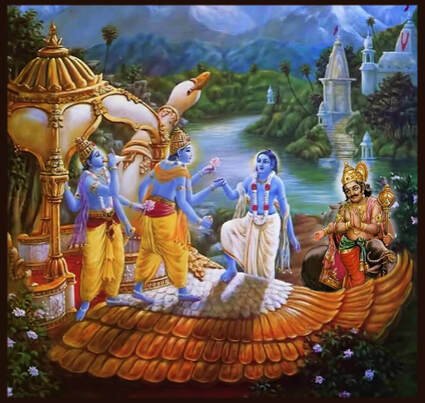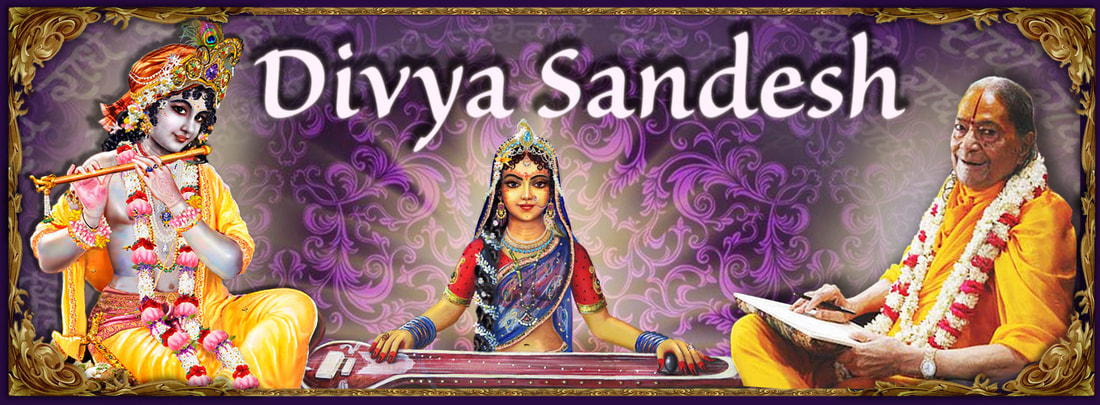 Am I a servant of God for eternity?
Am I a servant of God for eternity?
Question :
When we attend satsang, we hear statements such as “we are a servant of God” that sounds belittling. I perform all actions for my own happiness, not to bring joy to God.
Answer :
Perhaps we interpret the statement “Servant of God” as meaning that God is enjoying the pleasure of being served and individual souls (jeev) remain devoid of pleasure as they continue to serve. So our feelings are totally understandable because we material beings naturally desire to attain Happiness.
To answer this concern one would have to know God, jeev and their relationship.
When we attend satsang, we hear statements such as “we are a servant of God” that sounds belittling. I perform all actions for my own happiness, not to bring joy to God.
Answer :
Perhaps we interpret the statement “Servant of God” as meaning that God is enjoying the pleasure of being served and individual souls (jeev) remain devoid of pleasure as they continue to serve. So our feelings are totally understandable because we material beings naturally desire to attain Happiness.
To answer this concern one would have to know God, jeev and their relationship.
|
All our scriptures assert that God is happiness, bliss, peace etc. And jeev is an inseparable and eternal part of God. Every component or fraction naturally serves the source, from whom it has originated. That’s why our Scriptures unanimously proclaim that Jeev (soul) is an eternal servant of God.
For instance, the branches, leaves and stems etc. are parts of a tree and they serve their origin - the tree. If the tree were to die then no part of the tree can survive even for a moment. जीवेर स्वरूप होय कृष्णेर नित्य दास ।
Jīvēra svarūpa hōya kr̥ṣṇēra nitya dāsa । |
 Employees working to meet their boss's requirements
Employees working to meet their boss's requirements
Svarūpa means nature. Habits can be altered but nature cannot be altered, even if one were to practice for eons to change it.
People dislike being called servants. In the politically correct language of the world there are other terms being used like employees, partners, hired help, domestic helpers etc. But the fact is that all of these hired (employed) people are expected to support the cause of those who hire them. What else is the definition of a servant?
Even in a family, parents earn a living to educate and support their children and to provide for all their needs. All of these actions are actions of servitude.
People dislike being called servants. In the politically correct language of the world there are other terms being used like employees, partners, hired help, domestic helpers etc. But the fact is that all of these hired (employed) people are expected to support the cause of those who hire them. What else is the definition of a servant?
Even in a family, parents earn a living to educate and support their children and to provide for all their needs. All of these actions are actions of servitude.
When we invite friends and relatives home for dinner, we clean our house, cook food, buy gifts and arrange for entertainment and fun activities to please our guests. When we go to our friends or relatives’ house, they do the same for us. In general, when both parties reciprocate each others’ sentiments and efforts, the relationship sustains itself for a long time and gets stronger over time. On the other hand, if only one party makes the effort and the other party does not reciprocate, the relationship breaks down over a period of time.
So the truth is that we all provide our services to the other party in some form or the other and hence we all are servants. We seek happiness and if serving makes us happy then we do so, else we do not. So we are servants of happiness. There is not a single living being in God’s entire creation who wishes to be unhappy. Upon deeper introspection into our personality, we find that we work for happiness thus we are servants of happiness. We may not know it or may choose not to believe it!
The absolute Supreme Master God also serves us. In fact, He serves everyone and in ways that are beyond our comprehension. He
- created the world and provided for food, air, water and land for all living beings,
- permeates within each particle of the universe so that it functions as per the divine law,
- ensures that everyone gets basic needs according to their past karma
- records the actions of human beings,
- gives everyone the fruits of their past actions,
- makes sure every living being breathes in and out as expected,
- ensures that the food we eat gets digested
- sends His divine associates to Earth to guide His misguided children back to their rightful place.
- and the list goes on..
And He serves not only those who acknowledge Him as the Lord of the universe and love Him but also those who talk ill of Him or deny His existence. In fact, God serves so diligently that none other can come close to Him, let alone match Him. Thus, it is proven that Material Jeev are servants of God and God is also a servant of the entire creation.
How about after God-realization. Will I be a master then?
Even after God realization, Jeev continues to remain a servant of God. God-realized Saints serve God directly. They continually strive to please God. Before Lord Ram descended on earth, He asked all the residents of Saket Lok to play different roles during His pastime on earth as Ram, the son of King Dashrath and Queen Kaushalya. Everyone gladly accepted the characters that He wanted them to play. Then Lord Ram asked for the most difficult of all roles, He asked His associates,”who wants to be Kaikeyi?'' Without even thinking twice, everyone put their hands up. Lord Ram was surprised, He thought no-one heard Him right when He first asked the question, so He clarified, saying, “let me clarify, I am asking about being Kaikeyi not Kaushalya”.
Everyone responded back saying,“Yes we understand. And we also know that there is no Ramanyan without Kaikeyi. We are happy to help you in Ram Leela”. Shri Ram Chandra Ji tried the last time to clarify His ask, saying,“think again - nobody will ever name their daughter Kaikeyi”. Still everybody was willing to be Kaikeyi during His pastime on Earth. All because they wanted to please their Lord. That is the highest level of service.
Everyone responded back saying,“Yes we understand. And we also know that there is no Ramanyan without Kaikeyi. We are happy to help you in Ram Leela”. Shri Ram Chandra Ji tried the last time to clarify His ask, saying,“think again - nobody will ever name their daughter Kaikeyi”. Still everybody was willing to be Kaikeyi during His pastime on Earth. All because they wanted to please their Lord. That is the highest level of service.
If God wishes that a saint descends on the Earth, leaving their divine abode to educate people about God, the saint gladly follows God’s orders. Saints serve us just like a mother serves a child. Just like a child kicks the mother, poops and pees on her, yet she does not complain. Instead she cleans up the baby, looks after them and teaches them good manners and educates them. Similarly, we insult, abuse and openly demonstrate ill-will towards the saints, yet they work day and night to usher us on the path of devotion. They bear all this to please God.
What about the other relationships?
God is a very benevolent Master, so much so, that He provides His servants the right to establish a loving relationship with Him. He is willing to be our Master, Friend, Child and even a Beloved. He reciprocates our feelings. Read bhav article to know more about those relationships.
What about getting bliss?
|
Not all servants are equal. The Personal Assistant of a CEO of a small company with only 50 employees has very different powers, influence and receives a very different compensation than, say, the Personal Assistant of the President of the USA. Currently, we are the servants of Maya, the maid of God. Instead of serving God’s maid we need to promote ourselves to be the direct servant of God. Who can imagine the bliss of being a loyal servant of God?
When Lord Ram asked Hanuman Ji, “Hanuman! You have served me immensely with no desire for reward. I am pleased with you and wish to reward you. Ask me for whatever you want. I can grant you anything even with the reward of mukti”.
Hanuman Ji promptly responded with,”No no no. I don’t want mukti at all”. “Why?” Hanuman Ji answered - भवबानधच्छिदे तस्मै स्पृहयामि न मुक्तये ।
भवान्। प्रभुरहं दास, इति यत्र विलुप्यते ॥ |
|
bhavabānadhacchide tasmai spṛhayāmi na muktaye ।
bhavān। prabhurahaṃ dāsa, iti yatra vilupyate ॥ “So far the mere thought that ‘I am a daas of Lord Ram!’ brings me unexplainable joy. But after mukti, this bliss would cease forever”. In mukti the jeev merges in the Brahma. Therefore, all of the pain is gone forever. In addition, the unlimited bliss of serving Him is also lost forever.
So, please don't be offended when scriptures call us “servants of God” for it is not a belittling phrase. Strive to uplift yourself to your rightful place of being the servant of the Lord of the universe. Experience the bliss of lovingly serving Him. And you have the liberty to serve Him with any bhav you choose. When you attain your rightful place, then even the devi-devatas (yes, including Yamraj!) will bow down to you. |
|
अरे भक्त के सामने भी जाता है यमराज तो सिर नीचा कर के बैठता है और प्रार्थना करता है, "महाराज आप का समय हो गया है । यदि आप चाहें तो मैं विमान लाया हूँ ।" वहाँ भी वो अपना शासन नहीं चला सकता है । तो भक्त उसके सिर पर पैर रखकर पुष्पक विमान पर बैठता है ।
When it is time for a Saint to depart for his divine abode, Yamraj presents himself subserviently with his head bowed in reverence. He reminds the Saint that the time to depart has come and requests the Saint, if he so desires, to embark on the Pushpak Viman which will take the Saint to the divine abode.
Yamraj has no authority over a Saint. God grants the Saint such a high-status that to ascend into the Pushpak Viman the Saint uses the head of Yamraj as a step-stool. |
Suggested Reading










